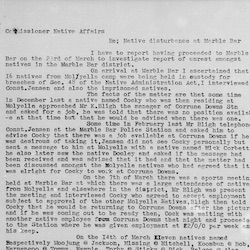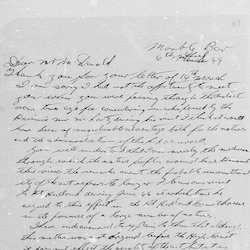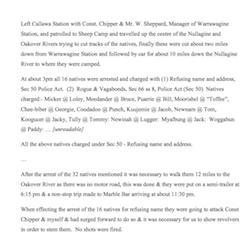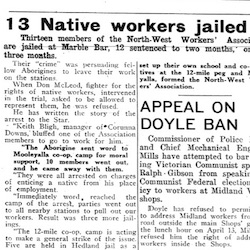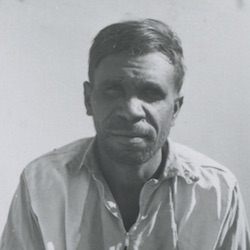Mac Gardiner (Pirntilkampanyaja) was still working on Warrawagine Station in 1949 and gave this account of his removal by strikers and their subsequent arrest.
Mac Gardiner, Thirty-Three Men
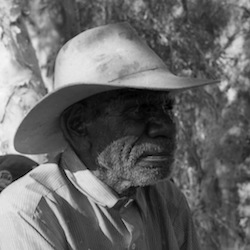
Palaja wani-waninyiyirni yarrarnakanu manayinganinyi. Yarrarna now, well yijamarta now milpanyiyi manayinganinyi nganarna maya-bloke. Kurni milpanyiyi manayinganinyi Thirty-three-lu nyarra marrngulu manayinganinyi. Pala nganarna jalypapirniyinganinyi now, munu nganarnamili karnu maya. Yajarnayirnijaninyi yanayirni kara, ngurnungu kara wanikinyiyirni ngapingi. Milinganinyanga wanikinyiyirni warrukayinyanga kara.
Waninyiyirni nyungu yirrinikinyiyirni kakarni milpanya pala policeman, milpanyayi kujarra policeman, walypala pala Warrukayinya-bloke maaja. Palanga ngapi milpanyanganaku pijungu. Chain parnpirni, chain kurtanja parnpirni kujarra bag. Karramarna , ‘here’s the two bag’, karramarnakanu, two bag chain, handcuff-pa parnpirni palarrangu. Ngalyingi wirrirni palajun nyungu Yulypina yartajirrimurniny; put’m ngalyingi chain. Palaja chuck’m way bag, chain. And revolver purrirni pocket-ja palalu. Nganarna altogether jump in, karramarnayirni wapakarnayirni wulikaja palanga policeman-ungu karramarnayirni, ‘Drop your gun’, karramarnayirnalu. Palangulu wirrirnijanaku ngalyingi chain makanu. Jinta handcuff-ngu. Kujarra kulinikinyipulinyi marrngujirri handcuff-ngu. Kujarralu policeman-ju kanyapulunganinyi Milinganinyaja that nyunguja ngapija pijuja palaja Nullagine River ngarra wurrarnaya. Palaja kanyapulunganinyi jinangu nganarna witness, station-bloke yanayirni right ngurnungu ngapikarti. Ngampurrupurrunya junction nyarra, Ngampurrupurrunya, palanga. Ngapa minpirniyirni pijujirripa kulunapularninyi Ngalangkanyupa Papurrunya. Ngalangkanyu, Nullagine River. Papurrunya, Oakover. Palanga yalinyi kanka karntinyiyirni ngapa minpinakanu. Semi-trailer milpanyikinyi ngapija Marble Bar-ja. Milpanya right, ngurnungu nyarra windmill waninyi parlkarranga, parlkarranga junction. Palanga yirrirniyirni ngapi truck, semi-trailer. Palanga karntinyiyirni ngapi, Callawa. Callawa-ja supper, ngapi, Yarrie. Kanyayinganyinyi right up jail-room, Marble Bar. Palaja muwarrpirniyi, win’m-jirni alright. Karramarna, ‘Anybody got a more to say?’ Palaja nyungu now old-man mirta palama karajirri waninyi, Mirlpanga; ngapi nyarra wurrarnaya walypilaja Jack Gardiner, old Jack Gardiner. Nyungu nursing-home-ja, pala. Palalu puruyiji wulikaja wrong muwarrpirniyi finish. Right, pala yanayi jinmurntu, jinta Port Hedland, jinta Roebourne, jinta Marble Bar-nga. Three months, yanayi jinmurntu.
We stayed [at Warrawagine], and they came back again to get us. This time they came in earnest to get all the station workers. Thirty-three marrngu came up from the south to support us. They [the station bosses] argued with us but we said no, we’ve only got humpies to live in. We went with the others out to the west, we went and made camp over in the west. We made camp at Milinganinya, west of Warrawagine.
We stayed there and one day we saw the police arriving from the east. There were two policemen and the white station boss from Warrawagine. They confronted us in the river. They threw chains down in front of us, they threw down two bags full of chains. They said, ‘See these two bags?’ And on saying this they threw down two bags with chains and handcuffs. They put chains around the neck of Yulypina and his father’s father, then threw away the bags. He pulled a revolver out of his pocket. Then we all jumped up and crowded around the policeman, crying out, ‘Drop your gun!’ So then he put a long chain around all our necks, and he put handcuffs on others. He shackled the marrngu together in pairs. The two policemen took us away from Milinganinya. That’s a place on what they call the Nullagine river. They led us away on foot, the rest of us station workers were to be witnesses. We walked all the way to Ngampurrupurrunya. Ngampurrupurrunya is the junction, and we had a drink of water where the two rivers join up together, the Ngalangkanya and the Papurrunya. The Ngalangkanya, that’s the Nullagine river, and Papurrunya is the Oakover. After we’d had a drink we climbed up the bank on the north side. A semi-trailer came in from Marble Bar. It stopped at the place where there was a windmill, on the flat ground near the junction. That’s where we saw that truck, the semi-trailer. We climbed on it and went to Callawa, and from Callawa we went on to Yarrie where we had supper. They took us straight to the jail at Marble Bar. Then they talked in the court-room, and they won of course. They asked us, ‘Has anybody got anything more to say?’ Then that old man who lives over in the west, Mirlpanga, they call him by his whitefella name, Jack Gardiner, old Jack Gardiner, he’s in the nursing home, him. He said that they were all talking wrong. Then they all went to jail, some to Port Hedland, some to Roebourne, some to Marble Bar. They went to jail for three months.
Citation
Audio: Mac Gardiner (Pirntilkampanyaja), tape 1, Warralong Station, 5 August 1993, Australian Institute of Aboriginal and Torres Strait Islander Studies Library.
Photo: Mac Gardiner, Shaw River 1993, Anne Scrimgeour.
.


